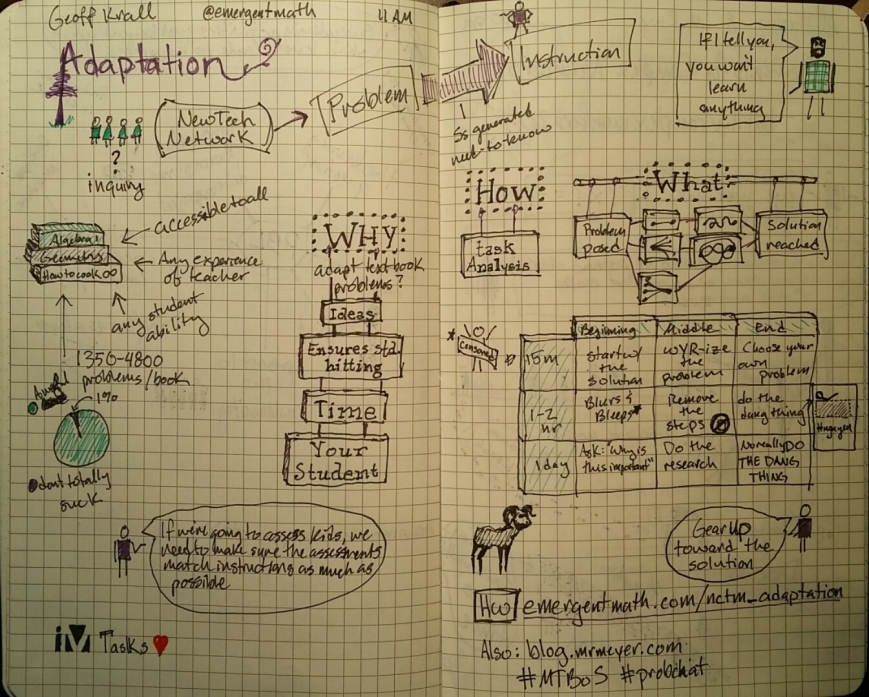Geoff Krall, who has posted all the things from his talk over on his blog, lead a session Thursday on thinking about how to adapt the tasks you have. Due to the work I do for Illustrative Mathematics, adapting tasks is something I think about a lot and something IM does with teachers at PD conferences frequently so it was great hearing Geoff’s perspective of the Why, How, and What of task adaptation.
First big point was made that textbooks by nature are generic. They have to have wide accessibility with respect to contexts used and be for teachers/students of a large range of abilities. I appreciated Geoff’s Fermi estimation strategy to conclude that each book likely has 13.5 – 48 problems that ‘don’t totally suck’ (assuming 99% on the other side).
Due to the nature of textbook problems, Geoff pointed out they are likely not going to be perfect as-is for doing what we need them to do in the classroom and made 4 points here for the room to think about:
- Do they cover the right ideas?
- Are you hitting the standards you need to hit?
- Do you have time for that task?
- Is the task right for your students?
That last point is one I really like. The teacher in that room is the one that knows the kids best–they have good ideas about when those kids will trip and when they can speed up because they are with them every day (I’m going to make an assumption that this is for classrooms with actual teacher-student and student-student dialogue and not just a person up at the front speaking while the younglings copy like diligent little automatons).
My favorite part of this was Geoff’s discussion on the ‘How’, which he facilitated by pulling up some generic problems for the room to consider and then ponder with the group on how they might be adapted. The conversations teachers have when tossing around ideas on how to adapt tasks are just delightful to listen to and engage in. Oh, opportunities for collaboration over neutral content, how I enjoy you.
The last bit was on the ‘what’ of adaptation. As you can see from all the little signs I have hanging off the ‘what’ between ‘problem posed’ and ‘solution reached’, I rather enjoyed Geoff’s path-visuals for thinking about task types. His chart on what to do based on how much time (oh, half to full day planning, you truly are a unicorn of teaching) you have and whether you are thinking about the beginning, middle, or end is also pure gold. The doodle off to the side with #nguyening is in reference to a post from Fawn Nguyen that was used as an example for that block. The sheep-thing is also relevant to another of Geoff’s examples which involved him getting a person from the Texas Parks and Wildlife Magazine to email his students a problem involving said sheep.
So if you have a task you want to adapt, head over to Geoff’s post and post it in a comment to get the conversation going. Or take it to some colleagues and see if you can get a conversation started there even if it’s just dropping it on their desk with a post-it note asking if they have any quick thoughts on the task they’d be willing to share with you. So many productive conversations to be had here.
This session was a pretty packed room and Geoff did a fantastic job making audience suggestions part of his presentation as well as having a great presence. I love that he’s out there sharing strategies and ideas for this side of teaching.
And yes, the plaid figure in the upper right is my attempt to draw Ron Swanson.


Pingback: in which I sketchnote all the things | Learning to Fold